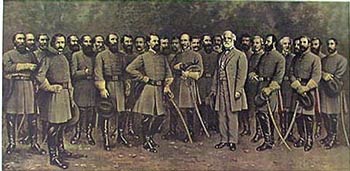Menu
County Neighbors
Military...Military Resources for Carroll County |
|
|
|
|
|
The War for Southern Independence:
FIRST
BATTALION, MISSISSIPPI SHARPSHOOTERS
(aka
10TH MS INFANTRY BATTALION, and aka 20TH MS INFANTRY
BATTALION) (from Dunbar Rowland’s "Military History of Mississippi, 1803-1898"; company listing courtesy H. Grady Howell’s "For Dixie Land, I’ll Take My Stand")
Company A -- Coms Avengers (raised in Carroll County, MS) Company B -- Red Rebels (raised in Holmes County, MS) Company C -- Capt. Leigh’s Independent Company (raised in Yalobusha County, MS) Company D -- Wigfall Guards (raised in Tennessee)
Formed from three Mississippi companies in the Twenty-fifth Mississippi, or Second Confederate, Regiment and Caruther's Sharpshooters. Also called Tenth Battalion Infantry; also Twentieth Battalion. Majors --William A. Rayburn, James M. Stigler. The "Mississippi Battalion, William A. Rayburn, Captain", is mentioned by General Van Dorn among the troops at Vicksburg, during the bombardment of May, June and July, 1862. Caruther's Sharpshooters, merged in this battalion, was a part of Gen. John S. Bowen's Brigade at the battle of Corinth, with Sixth, Fifteenth and Twenty-second Mississippi Regiments. General Lovell mentioned them as particularly distinguished in the successful assault upon the outer line October 3, 1862. Commanded by Captain Caruthers, in the skirmish line with the First Missouri, and with the Twenty-second Mississippi in charging and capturing a battery, they were conspicuous for coolness and courage, said General Bowen. They were in line of battle and under artillery fire on the 4th. On the 5th Bowen, as rear guard on the retreat, was pursued and attacked by cavalry, which was repulsed by two companies of Jackson's cavalry, the Mississippi battalion and Lieutenant Barlow's artillery section. January, 1863, in Rust's Brigade of Loring's Division, Fourth Military District, Maj .-Gen. Loring commanding reserve corps at Jackson. March 24, 1863, the battalion was at Wilson's, six miles above the mouth of Deer Creek, obstructing the creek by felling trees, and were reinforced by the command of Gem S. D. Lee, to meet the Federal advance along the creek. Rayburn's First Battalion Sharpshooters, with Holland's Thirty-seventh Regiment, made reconnaissance of Federal position on the Tallahatchie near Fort Pemberton, April 4, 1863. May 30 return, First Mississippi Battalion Sharpshooters, Maj. W. A. Rayburn, Featherston's Brigade. July 30, Maj. J. M. Stigler, commanding. Maj. James M. Stigler commanding, in Featherston's Brigade, Loring's Division, army of Gen. Polk, concentrated at Canton when Sherman began his march to Meridian from Vicksburg, February, 1864; fell back to Demopolis, Ala. Part of Featherston's Brigade, during the Atlanta campaign, beginning with Resaca, May 12-16, and including the skirmishing on the Cassville line, were distinguished for daring on the skirmish line at New Hope Church, May 27, the incessant sharpshooting and artillery work of entrenched lines near New Hope Church, the memorable battles of skirmish lines around Kenesaw Mountain, notably the repulse of the Federal attack near the base of the mountain, by Marietta, by Stigler's Battalion and the Third Regiment, on the skirmish line, June 27. The battalion participated in the fatal assault upon the Federal line on Peachtree Creek, July 20, losing 4 killed, including the Adjutant, 21 wounded, and 7 missing; was also in the attack of July 28, on the Lickskillet road, and served in the trenches around Atlanta until the evacuation, September 1. In the Tennessee campaign the battalion shared the gallant action of Featherston's Brigade in the assault at Franklin November 30, and the brigade losses of 352 killed, wounded and missing. They were in the battle of Nashville, December 15-16, and with the rear guard under Walthall on the retreat, in the actions at Columbia, Anthony's Hill, and Sugar Creek. After crossing the Tennessee River December 28, they moved with the army to Tupelo. Major Stigler was in command of the battalion December 10, 1864, and the aggregate present December 21, was 63. In the last battle of the army, at Bentonville, N. C., March 19-21, 1865, about sundown, in the last volley, Major Stigler, a lieutenant and one of two enlisted men were wounded. Organization of March 31 Featherston's Brigade commanded by Maj. Martin A. Oatis, the First Battalion by Lieut. E. H. Griffis. April 9, First, Twenty-second and Thirty-third Regiments and First Battalion consolidated as the Twenty-second Regiment, Col. Martin A. Oatis, commanding.
|
|
Carroll County

Coordinator:
I am
John Hansen,
volunteer County Coordinator for Carroll County, Mississippi. I have
family lines from here and hence my interest in establishing as much
information as possible on early Carroll County History.
Web Site:
The
Carroll County, Mississippi Genealogical and Historical Web Site was brought
online in 1998, and is sponsored by the
MSGenWeb Project,
a part of the
USGenWeb Project.
This website has been developed to provide research and family history
resources for Carroll County, Mississippi ancestry.
New resources are added as made available, so check back often for new
content.
